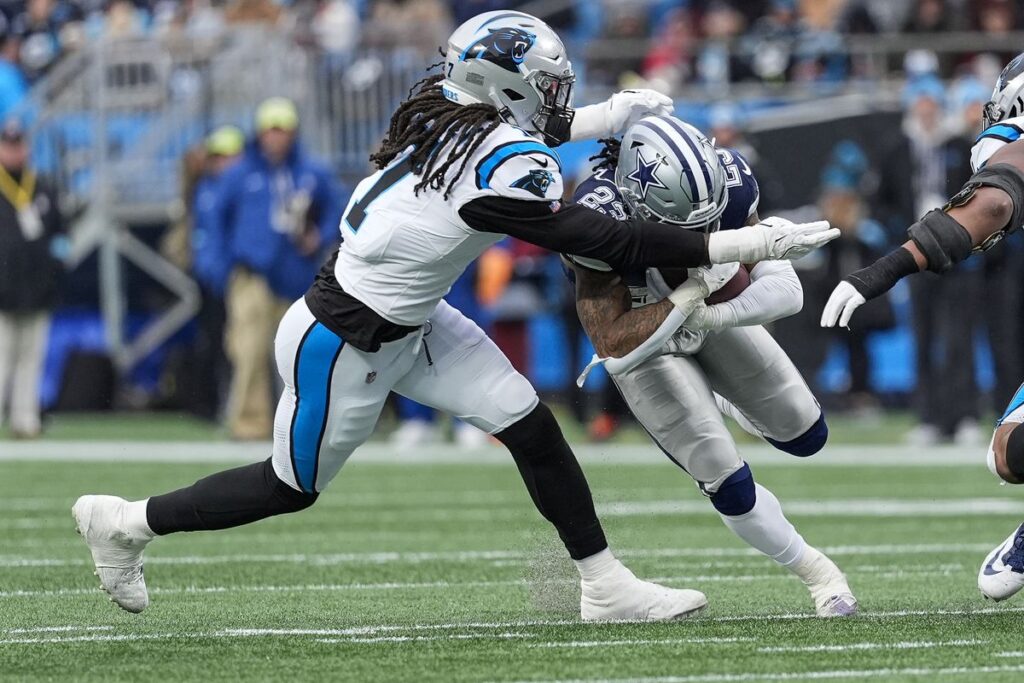
Jadeveon Clowney and the Carolina Panthers: A High-Profile Homecoming and Its Aftermath
In March 2024, the Carolina Panthers made one of the most notable offseason acquisitions in franchise history by signing veteran linebacker and defensive end Jadeveon Clowney to a two-year, $20 million contract. It was a move that went beyond just football. Clowney, a native of Rock Hill, South Carolina, and a former star at the University of South Carolina, was returning home. For both the Panthers organization and Clowney himself, the agreement symbolized more than just numbers on a paycheck—it was a personal and professional reunion filled with hope, expectations, and a belief that a new chapter could elevate both player and team.
Yet, as with many narratives in the ever-unforgiving world of the NFL, things didn’t unfold exactly as planned. What followed was a season of highs and lows, a stark reminder of the brutal efficiency with which football treats performance and production. Ultimately, the Panthers released Clowney in May 2025, just over a year into his deal. His time in Carolina had come to a close, but the story of that time is far from a disappointment—it’s a complex portrait of a player’s enduring talent and the harsh realities of roster management in the modern NFL.
Jadeveon Clowney’s path to the NFL was paved with extraordinary moments. He was a once-in-a-generation high school prospect at South Pointe High in Rock Hill, South Carolina, where he earned national attention for his athleticism, explosiveness, and raw power. He then played three years at the University of South Carolina, terrorizing SEC quarterbacks and becoming a household name with one of the most famous hits in college football history during the 2013 Outback Bowl.
Drafted first overall in the 2014 NFL Draft by the Houston Texans, Clowney entered the league with sky-high expectations. Over the course of his career, he would play for five different teams before landing with the Panthers, including notable stints with the Seahawks, Titans, Browns, and Ravens. Known for his ability to disrupt plays in the backfield, Clowney built a reputation as one of the league’s most ferocious edge defenders, even if he never quite reached the dominant, All-Pro levels some had forecasted.
The decision by Carolina to bring Clowney home in 2024 was driven by both on-field needs and off-field symbolism. The Panthers had just traded away Pro Bowl edge rusher Brian Burns and lost Yetur Gross-Matos to free agency, leaving a massive void on their defensive line. Clowney, then 31 years old, was seen as the ideal short-term solution—a seasoned pass rusher who could bring leadership, versatility, and familiarity with defensive coordinator Ejiro Evero’s 3-4 scheme.
When the season began, Clowney was quickly inserted into the starting lineup, expected to anchor a relatively inexperienced pass-rushing unit alongside free agent addition D.J. Wonnum. Clowney played 14 games during the 2024 season, starting 13 of them and logging over 700 defensive snaps. Statistically, he turned in a respectable year: 46 total tackles, 5.5 sacks, 11 quarterback hits, and 4 passes defended.
However, those numbers did not tell the full story. The Panthers defense struggled mightily throughout the season. They finished dead last in the NFL in total defense, allowing over 400 yards per game, including nearly 180 yards per game on the ground. While Clowney was not the direct cause of these issues, the unit as a whole never found its rhythm. Injuries, poor communication, and inconsistent execution plagued the group from Week 1 through Week 18.
Clowney, for his part, showed flashes of his former self—blowing up running plays, chasing down quarterbacks, and even tipping a few passes at the line of scrimmage. But he was never able to fully compensate for the loss of talent around him. As the season wore on, it became clear that while Clowney remained a solid contributor, he wasn’t the game-changing presence he had once been. The Panthers finished the year with a 5–12 record, missing the playoffs and initiating yet another period of organizational self-examination.
When the 2025 offseason began, rumors quickly surfaced that Clowney might be on the chopping block. Though he was under contract for another season, his cap hit was substantial—around $9 million—and the Panthers had made aggressive moves to reload their defense. They drafted Texas A&M standout Nic Scourton and Ole Miss pass rusher Princely Umanmielen in April, both of whom projected as younger, cheaper options on the edge. They also signed former Vikings linebacker Patrick Jones II to a deal that mirrored Clowney’s original contract: two years, $20 million.
Faced with a decision, Carolina’s front office opted to release Clowney in early May 2025. The move saved approximately $7.8 million in cap space, giving the team financial flexibility heading into training camp. Though the release was framed as a business decision, it carried emotional weight. Clowney had returned home to be part of something bigger—to play in front of friends and family, to perhaps finish his career where it all began. Instead, he was let go after just one year.
Reaction to Clowney’s release was mixed. Some fans were disappointed, feeling the team had not given him enough time to prove himself. Others viewed it as a logical next step in a larger rebuild, one that required the franchise to focus on youth and long-term development rather than nostalgia and sentiment.
From Clowney’s perspective, he remained professional. In a brief statement, he thanked the Panthers organization, his teammates, and the fans for their support. He expressed no bitterness—only gratitude for the opportunity. As of this writing, he has not signed with another team, though there is a strong expectation that he will land somewhere before the 2025 season begins. Veteran pass rushers with his resume are rarely without work for long.
Though his time with the Panthers was short-lived, Clowney’s impact should not be minimized. He brought leadership and effort to a team that was struggling to find its identity. Younger players consistently cited his influence in the locker room. Coaches praised his work ethic and willingness to mentor, even as the losses piled up.
In terms of legacy, Clowney’s stint with the Panthers may not be remembered for Pro Bowls or record-breaking performances. But it will be remembered as a homecoming—a heartfelt attempt to write a meaningful chapter in the place where his football journey began. For fans of South Carolina football and those who followed his career from the beginning, his year with the Panthers closed a loop that had remained open for over a decade.
Jadeveon Clowney’s experience with the Panthers is emblematic of a broader truth about the NFL: even the most talented players face constant evaluation and the threat of release. As players age, they must not only fend off younger competitors but also adapt to ever-shifting team strategies, salary cap constraints, and new coaching philosophies. For every Tom Brady or Aaron Donald who plays well into their late 30s or beyond, there are dozens of veterans like Clowney who must fight year after year for a roster spot.
This doesn’t diminish Clowney’s career—on the contrary, it highlights the resilience and adaptability required to stay in the league for over a decade. With 58 career sacks, 139 quarterback hits, and over 400 total tackles, he has compiled a résumé that most players would envy. More importantly, he has done so while dealing with injuries, scheme changes, and media scrutiny.
The next chapter for Clowney remains unwritten. He could sign with a contender looking for rotational pass-rushing help. He could join a rebuilding team that wants a veteran to help guide its young players. Or he could consider retirement, ending his career with over 140 games played across six franchises.
Whatever he chooses, Jadeveon Clowney has already carved out a lasting legacy in football—first as a South Carolina high school legend, then as a college superstar, and finally as a battle-tested NFL veteran. His return to Carolina may not have ended in storybook fashion, but it added depth and emotion to an already compelling career.







